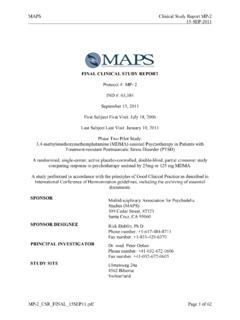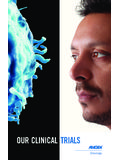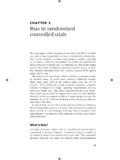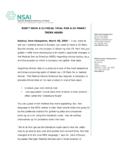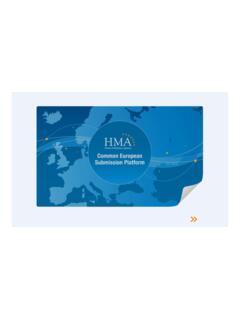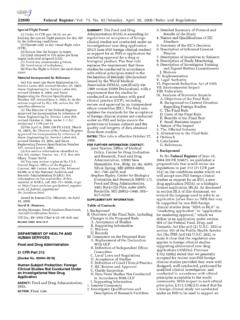Transcription of Phase II clinical trial testing the safety and efficacy of ...
1 MDMA-assisted Psychotherapy in Chronic PTSD 9/24/03, revised -01/23/2009 0 Principal Investigator: Michael C Mithoefer. Sponsor: MAPS Study Protocol Phase II clinical trial testing the safety and efficacy of 3,4-methylenedioxymethamphetamine (MDMA)-assisted psychotherapy in subjects with chronic posttraumatic stress disorder. Study # 63-384 Original Protocol: September 24, 2003 Protocol Amendment #1: November 17, 2004 Protocol Amendment #2: June 23, 2005 Protocol Amendment# 3 March 13, 2006 Protocol Amendment # 4 November 10, 2006 Protocol Amendment # 5 August 27, 2007 Principal Investigator Michael C. Mithoefer MD 208 Scott St. Mt. Pleasant, SC 29464 Sponsor Multidisciplinary Association for Psychedelic Studies (MAPS) 10424 Love Creek Rd.
2 , Ben Lomond CA 95005-9467). MDMA-assisted Psychotherapy in Chronic PTSD 9/24/03, revised -01/23/2009 1 Principal Investigator: Michael C Mithoefer. Sponsor: MAPS Investigators and Institutional Review 2 Aims and Goals .. 3 Specific 3 Background .. 4 7 General Study Design .. 7 Data Analysis .. 9 Subjects .. 11 Who and Why .. 11 Total Number/Number per group .. 11 Inclusion/Exclusion Criteria .. 12 Initial Contact Method and Informed Consent Process .. 14 Screening Process .. 15 Study Procedures .. 15 Study Outcome Measures .. 16 Baseline 17 Non-Experimental Psychotherapy Sessions .. 17 Sessions Employing the Experimental Intervention .. 18 Drugs and Dosing .. 18 Measures during Experimental Intervention Session.
3 20 Psychotherapeutic Procedures during Experimental Session .. 20 Monitoring for Toxicity .. 22 Research Follow Up .. 24 Therapy 25 Third Open-Label Experimental Session .. 25 Open Label Continuation for Placebo Subjects .. 26 Long-Term Follow-up .. 27 Costs to Participants.. 28 Treatment and Compensation of Study Related 28 Risks to Participants .. 29 Risks and Discomforts Associated with Drawing 29 Risks and Discomforts Associated with Screening Procedure .. 29 Risks and Discomforts Associated with the Experimental Intervention .. 29 Potential Neurotoxicity Associated with Ecstasy Use .. 32 Alternative treatments and procedures: .. 34 Risk-Benefits Analysis .. 36 References .. 37 Appendix A: Procedures for Treating Serious Adverse Events.
4 44 Appendix B: Procedures used for Audio and Video Recording .. 49 MDMA-assisted Psychotherapy in Chronic PTSD 9/24/03, revised -01/23/2009 2 Principal Investigator: Michael C Mithoefer. Sponsor: MAPS Investigators and Institutional Review Board Principal Investigator Michael C. Mithoefer MD 208 Scott St., Mt. Pleasant, SC 29464 Other Investigators Ann T. Mithoefer BSN 208 Scott St., Mt. Pleasant, SC 29464 Mark T. Wagner, Director, Neuropsychology Section Associate Professor of Neurology Medical University of South Carolina 96 Johathan Lucas Street Charleston, SC 29425-9691. Melinda Edwards MD, 208 Scott St. Mt. Pleasant SC 29464 Michal Baird, MD 308 Sta. 191/2 Sullivan's Island, SC 29482 Institutional Review Board Coperrnicus Group IRB 118 MacKenan Dr.
5 , Suite 400 Cary NC 27511 MDMA-assisted Psychotherapy in Chronic PTSD 9/24/03, revised -01/23/2009 3 Principal Investigator: Michael C Mithoefer. Sponsor: MAPS Aims and Goals The current protocol is a randomized double-blind placebo-controlled pilot study of the safety and effects of MDMA-assisted psychotherapy on symptoms of chronic, treatment-resistant posttraumatic stress disorder (PTSD). This study follows three FDA-approved Phase I safety studies (one sponsored by MAPS and two by the National Institute on Drug Abuse), is endorsed by the principal investigators of all three of these studies, and is the first FDA-approved scientific study of MDMA-assisted psychotherapy in any patient population.
6 Findings from this study will be used to guide development of a second pilot study to refine and standardize MDMA-assisted psychotherapy for PTSD patients. If results of both of these pilot studies, plus another small pilot study to be conducted in Israel, are promising, the data gathered will be used to inform the design of two large (N= at least 280) multi-site Phase III studies of MDMA-assisted psychotherapy as a treatment for PTSD. MAPS' clinical Plan (Doblin 2002) will require at least 5 years and will involve at least 600 subjects. Specific Hypotheses The proposed study is intended to test whether MDMA-assisted psychotherapy can be safely administered to people with treatment-resistant PTSD or veterans with PTSD symptoms that have endured for one to five years who are unable or unwilling to undergo conventional psychotherapy or pharmacotherapy for PTSD, and if it will produce improvement in PTSD signs and symptoms four days after each of two experimental intervention sessions and again at a follow-up evaluation conducted two months after the second experimental session.
7 Improvement will be indicated by lower scores on established outcome measures of PTSD symptoms that were used in prior studies which formed the basis of FDA decisions to approve Zoloft and Paxil for the treatment of PTSD, with participants in the MDMA condition expected to have lower scores than participants in the placebo condition. It is also expected that MDMA will not affect cognitive function when measured two months after the second experimental session. The hypotheses to be tested by the proposed study are stated below: 1. Volunteers receiving MDMA-assisted psychotherapy will experience (trends toward) a greater decrease in signs and symptoms of PTSD than controls after each experimental session, as measured by the clinician-rated PTSD Scale (CAPS), the self-reported Impact of Events Scale (IES) and Symptoms Checklist-90-R (SCL-90-R).
8 2. Volunteers receiving MDMA-assisted psychotherapy will experience (trends toward) a greater decrease in signs and symptoms of PTSD than controls at two months after the second drug-assisted (MDMA or placebo) session. 3. Exposure to MDMA will not be associated with neurocognitive toxicity as assessed by the Repeatable Battery for Assessment of Neuropsychological Status (RBANS), the Paced Auditory Serial Addition Task (PASAT) and the Rey-Osterrieth Complex Figure Test. MDMA-assisted Psychotherapy in Chronic PTSD 9/24/03, revised -01/23/2009 4 Principal Investigator: Michael C Mithoefer. Sponsor: MAPS The primary outcome measure evaluating efficacy will be the Clinician-Administered PTSD Scale (CAPS).
9 Secondary outcome measures evaluating efficacy will be the Impact of Event Scale (IES) and the Symptom Checklist 90-R. The assessment of neuropsychological status serves as a means of safety evaluation and is measured by the Repeatable Battery for the Assessment of Neuropsychological Status (RBANS), the Paced Auditory Serial Addition Task (PASAT), and the Rey-Osterrieth Complex Figure. The NEO Personality Inventory is a neuropsychological measure of personality that is also part of our safety evaluation. Background MDMA is a ring-substituted phenylisopropylamine derivative with a unique profile of psychopharmacological effects that make it well suited to intensive psychotherapy. MDMA has been hypothesized to represent a new class of psychoactive agents, called entactogens (Nichols 1986; Nichols 1990), producing feelings of closeness to others, empathy, well being, and insightfulness, with little perceived loss of control (Grinspoon and Bakalar 1986; Hegadoren et al.)
10 1999; Nichols 1986; Shulgin and Nichols 1978). There is considerable previous human experience with the use of MDMA in the context of psychotherapy. Before MDMA was classified in 1985 as a controlled substance, a number of therapists employed it as an adjunct to psychotherapy in the United States and Europe (Adamson 1985; Gasser 1994; Greer and Tolbert 1998; 1986; Grinspoon and Bakalar 1986). Although no properly controlled trials were conducted, these therapists concluded that MDMA could be safely administered and was clinically useful in treating various sub- clinical or clinical psychiatric conditions, including posttraumatic stress disorder. More recently, placebo-controlled clinical trials have confirmed reports from therapists that MDMA produces an easily-controlled intoxication characterized by euphoria, increased well being, sociability, self-confidence, and extroversion (Cami et al.
